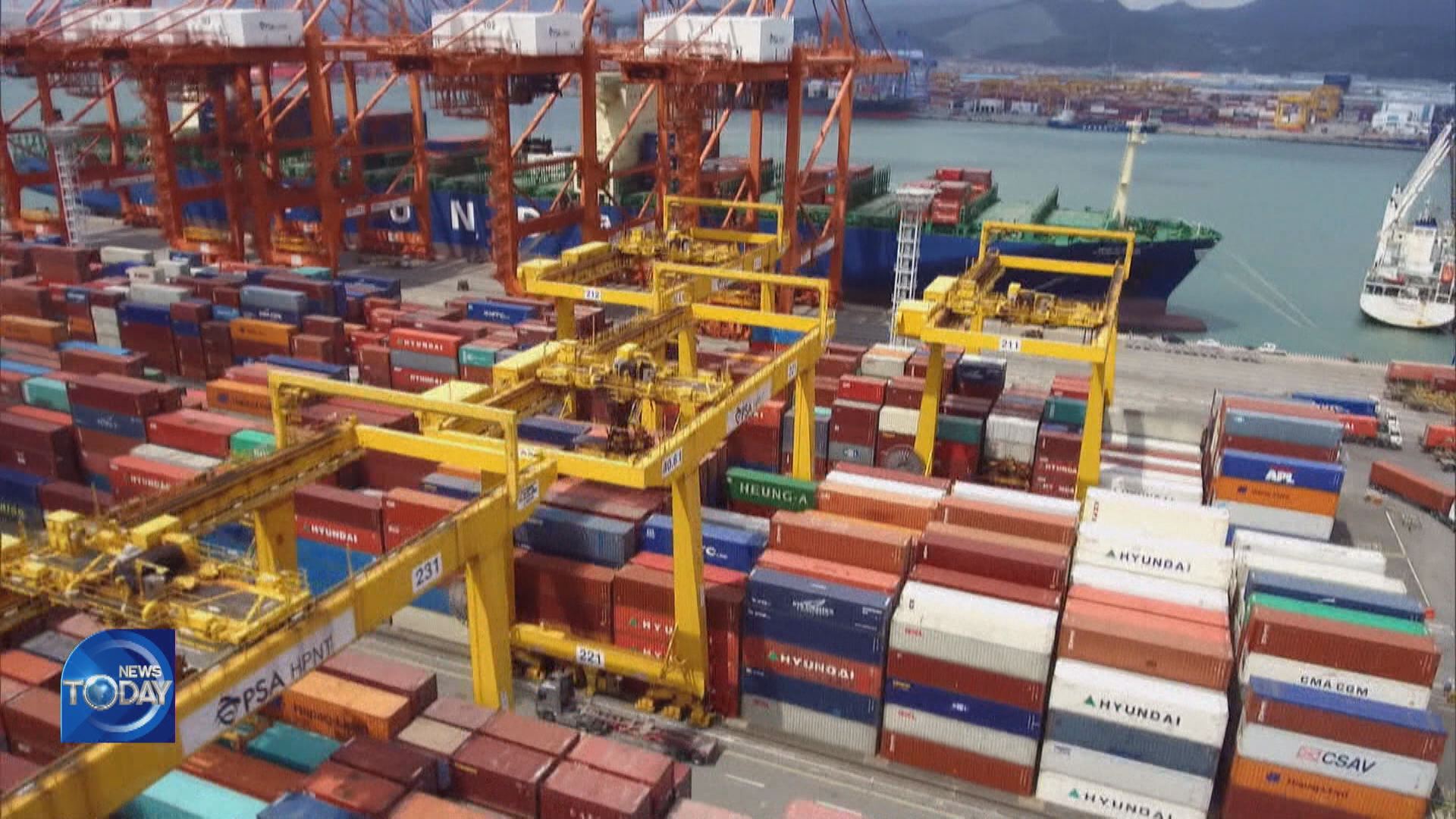TRADE DEFICIT CONTINUES
입력 2022.08.02 (15:05)
수정 2022.08.02 (16:45)
읽어주기 기능은 크롬기반의
브라우저에서만 사용하실 수 있습니다.
[Anchor Lead]
Korea has posted a trade deficit for the fourth consecutive month for the first time in 14 years. Soaring energy prices are largely to blame.
[Pkg]
With international energy prices skyrocketing, the amount of imports is also growing. Imports of crude oil, gas and coal recorded 18.5 billion dollars in July. That's nearly twice as much compared to a year ago. The increase in energy imports, which account for the largest share of the nation's imports, has affected overall trade balance. Korea posted a trade deficit of 4.67 billion dollars last month. The nation's trade balance has been in the red since April. The last time the nation posted a trade deficit for four straight months was in 2008 during the Asian financial crisis. Exports recorded the largest amount for the month of July, but the overall deficit expanded because of the record-high imports in the same month. The accumulated trade deficit this year has already reached an all-time high of 15 billion dollars. The external export environment also remains challenging, with a trade deficit with China remaining for the third straight month for the first time in 30 years due to China's economic slowdown. Concerns are rising that exports have stopped growing, with the export growth rate remaining in single digits for two months in a row.
[Soundbite] Joo Won(Hyundai Economic Research Inst.) : "The IMF has recently significantly slashed the global economic forecast. When Korea's major markets struggle, its export growth also goes down. Expecting double-digit growth like in the past would be difficult."
On the upside exports of semiconductors, petrochemicals and automobiles are growing steadily. Exports to the U.S. and ASEAN also still grow at a high rate. The government says it takes the situation seriously and will lay out comprehensive measures for export businesses within this month.
Korea has posted a trade deficit for the fourth consecutive month for the first time in 14 years. Soaring energy prices are largely to blame.
[Pkg]
With international energy prices skyrocketing, the amount of imports is also growing. Imports of crude oil, gas and coal recorded 18.5 billion dollars in July. That's nearly twice as much compared to a year ago. The increase in energy imports, which account for the largest share of the nation's imports, has affected overall trade balance. Korea posted a trade deficit of 4.67 billion dollars last month. The nation's trade balance has been in the red since April. The last time the nation posted a trade deficit for four straight months was in 2008 during the Asian financial crisis. Exports recorded the largest amount for the month of July, but the overall deficit expanded because of the record-high imports in the same month. The accumulated trade deficit this year has already reached an all-time high of 15 billion dollars. The external export environment also remains challenging, with a trade deficit with China remaining for the third straight month for the first time in 30 years due to China's economic slowdown. Concerns are rising that exports have stopped growing, with the export growth rate remaining in single digits for two months in a row.
[Soundbite] Joo Won(Hyundai Economic Research Inst.) : "The IMF has recently significantly slashed the global economic forecast. When Korea's major markets struggle, its export growth also goes down. Expecting double-digit growth like in the past would be difficult."
On the upside exports of semiconductors, petrochemicals and automobiles are growing steadily. Exports to the U.S. and ASEAN also still grow at a high rate. The government says it takes the situation seriously and will lay out comprehensive measures for export businesses within this month.
■ 제보하기
▷ 카카오톡 : 'KBS제보' 검색, 채널 추가
▷ 전화 : 02-781-1234, 4444
▷ 이메일 : kbs1234@kbs.co.kr
▷ 유튜브, 네이버, 카카오에서도 KBS뉴스를 구독해주세요!
- TRADE DEFICIT CONTINUES
-
- 입력 2022-08-02 15:05:20
- 수정2022-08-02 16:45:38

[Anchor Lead]
Korea has posted a trade deficit for the fourth consecutive month for the first time in 14 years. Soaring energy prices are largely to blame.
[Pkg]
With international energy prices skyrocketing, the amount of imports is also growing. Imports of crude oil, gas and coal recorded 18.5 billion dollars in July. That's nearly twice as much compared to a year ago. The increase in energy imports, which account for the largest share of the nation's imports, has affected overall trade balance. Korea posted a trade deficit of 4.67 billion dollars last month. The nation's trade balance has been in the red since April. The last time the nation posted a trade deficit for four straight months was in 2008 during the Asian financial crisis. Exports recorded the largest amount for the month of July, but the overall deficit expanded because of the record-high imports in the same month. The accumulated trade deficit this year has already reached an all-time high of 15 billion dollars. The external export environment also remains challenging, with a trade deficit with China remaining for the third straight month for the first time in 30 years due to China's economic slowdown. Concerns are rising that exports have stopped growing, with the export growth rate remaining in single digits for two months in a row.
[Soundbite] Joo Won(Hyundai Economic Research Inst.) : "The IMF has recently significantly slashed the global economic forecast. When Korea's major markets struggle, its export growth also goes down. Expecting double-digit growth like in the past would be difficult."
On the upside exports of semiconductors, petrochemicals and automobiles are growing steadily. Exports to the U.S. and ASEAN also still grow at a high rate. The government says it takes the situation seriously and will lay out comprehensive measures for export businesses within this month.
Korea has posted a trade deficit for the fourth consecutive month for the first time in 14 years. Soaring energy prices are largely to blame.
[Pkg]
With international energy prices skyrocketing, the amount of imports is also growing. Imports of crude oil, gas and coal recorded 18.5 billion dollars in July. That's nearly twice as much compared to a year ago. The increase in energy imports, which account for the largest share of the nation's imports, has affected overall trade balance. Korea posted a trade deficit of 4.67 billion dollars last month. The nation's trade balance has been in the red since April. The last time the nation posted a trade deficit for four straight months was in 2008 during the Asian financial crisis. Exports recorded the largest amount for the month of July, but the overall deficit expanded because of the record-high imports in the same month. The accumulated trade deficit this year has already reached an all-time high of 15 billion dollars. The external export environment also remains challenging, with a trade deficit with China remaining for the third straight month for the first time in 30 years due to China's economic slowdown. Concerns are rising that exports have stopped growing, with the export growth rate remaining in single digits for two months in a row.
[Soundbite] Joo Won(Hyundai Economic Research Inst.) : "The IMF has recently significantly slashed the global economic forecast. When Korea's major markets struggle, its export growth also goes down. Expecting double-digit growth like in the past would be difficult."
On the upside exports of semiconductors, petrochemicals and automobiles are growing steadily. Exports to the U.S. and ASEAN also still grow at a high rate. The government says it takes the situation seriously and will lay out comprehensive measures for export businesses within this month.
이 기사가 좋으셨다면
-
좋아요
0
-
응원해요
0
-
후속 원해요
0












![[속보] 추경안, 국회 예결소위 통과…<br>국민의힘 퇴장·민주당 단독 처리](/data/layer/904/2025/07/20250704_YazNaR.jpg)




이 기사에 대한 의견을 남겨주세요.